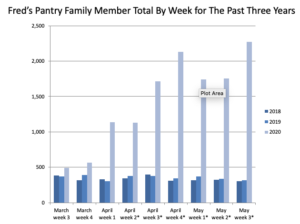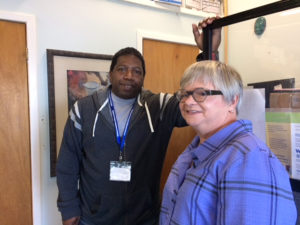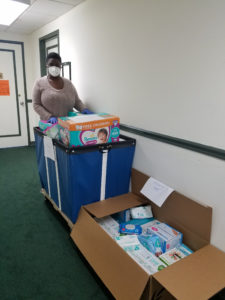
When Arthur Holmes took over, in early March, as coordinator of Fred’s Pantry, a food bank for the needy in Peekskill, he inherited a well-established system that had operated for decades.
Within two weeks, everything changed. Amidst the outbreak of COVID–19, he was suddenly faced with loss of volunteers, skyrocketing demand for services, and an array of new safety restrictions.
Holmes, a 52–year–old Peekskill native and the only full-time staff person at Fred’s Pantry, knew that his work needed to continue. “You have to be creative, think quickly” he explains. “And you can’t panic.”
For local social services organizations and their staff on the front lines, the COVID crisis has strained resources at the same time that demand for their programs has surged. Workers have forged ahead to meet the critical needs of vulnerable community members, drawing more than ever on partnerships and rapidly adapting to changed conditions.
BASIC NECESSITIES
Following Governor Cuomo’s March 7, 2020 declaration of a statewide disaster emergency, one clearly defined job was that of “providers of basic necessities to economically disadvantaged populations, including homeless shelters, congregate care facilities and food banks.”

“Of course our work is essential,” says Cynthia Knox, CEO of Caring for the Hungry and Homeless of Peekskill (CHHOP), the non-profit organization that runs Fred’s Pantry and several other programs based at its North Water Street location in Peekskill. CHHOP provides housing and case management services for survivors of domestic violence, homeless and disabled individuals, and Veterans.
As the crisis erupted, Ms. Knox knew that few aspects of this critical programming could be done remotely. She has been able to rotate certain staff members to minimize their exposure, but the organization now typically maintains seven or eight employees on-site.
In Ossining, the staff of the Community Action Program (CAP) also had little doubt they would continue their on-site work.
“We knew we had to stay open because of the services we provide,” says Kemi Pogue, area director for CAP, a division of Westchester Community Opportunity Program (WestCop), a non-profit anti-poverty organization.
HEATING AND FOOD
Ossining CAP helps low-income community members access heating assistance through the Low-Income Home Energy Assistance Program (LIHEAP) and food through the Supplemental Nutrition Assistance Program (SNAP). It also operates an emergency food pantry and advocates on behalf of Ossining residents to prevent evictions.
Ms. Pogue and a co-worker are the group’s only two full-time employees. She says that when the order came down deeming them essential workers, “it activated our passion even more.”
At Fred’s Pantry, Arthur Holmes shifted to a “bag and go” method. Food is now pre-bagged and the queue is spaced out to allow one-on-one distribution. Across CHHOP’s programs, Ms. Knox had implemented new procedures to comply with Center for Disease Control (CDC) guidelines for homeless service providers. At Jan Peek House, CHHOP’s local shelter, residents and staff can no longer congregate in common areas and sleeping spaces are at least six feet apart.
At the Ossining CAP, hours for appointments have been shortened to 10 a.m–1 p.m. “We also do later appointments to accommodate families where people are working,” Ms. Pogue explains.
TIME TO SANITIZE

Appointment times are now staggered and everyone must wear gloves and a mask. “We provide these protective items to clients if necessary,” says Pogue. The CAP staff leaves extra time in between scheduled appointments to sanitize the office area.
“At the beginning, it was a little overwhelming,” recalls Ms. Pogue. “So many people coming to the office, our phones ringing and my inbox overflowing.”
While clients still sought help with SNAP applications, many more were requesting emergency food, diapers and wipes, and now seeking unemployment and health insurance. She has also been working to obtain school supplies for households where children are now learning remotely.
In Peekskill, Fred’s Pantry went from typically serving 100 households per week to serving well over 500 individuals by the third week of May. Mr. Holmes attributes a portion of this rise in numbers to the temporary closure of some other food pantries and vendors in the area. But he also observes that many local people are coming to Fred’s Pantry for the first time in their lives.
“I was unloading the van one day and a group of people approached me to ask about the pantry. They had all lost their jobs, had never been here before, and were trying to get help. It was heartbreaking to hear their stories.”
‘ALL ABOUT PARTNERSHIPS’
As the Ossining CAP staff began responding to this crisis, it didn’t take long for Pogue to understand that “we can’t do everything.” She emphasizes that CAP’s model has always been “all about partnerships” and that it is more critical now than ever.
“Teamwork makes dreamwork,” she says. “We are doing a lot here but there are many organizations in Ossining doing this work with us. I am proud to say I live in Ossining.”
Arthur Holmes praises his volunteer corps, which he helped re-build after losing many previous volunteers at the outset of the crisis.
“I consider it a family, the volunteers and us,” he says. Now, although he works long hours and sometimes “feels like he lives at the pantry,” he is confident that he can continue to do his job.
Holmes, who says that years ago he came to the pantry himself for food, says “you should have a passion for this work. It’s about the people, not about you.”
- CHHOP 914.736.2636, chhop.org
- Ossining CAP 914-488-2277, kpogue@westcop.org
Robert McCreanor is an attorney and writer living in Peekskill.







